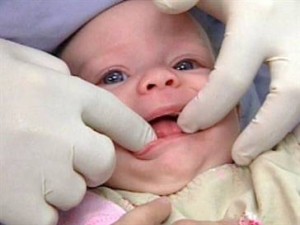Brushing and Flossing to Prevent Baby Tooth Decay
 In a previous baby dentist blog post, we have talked about the importance of beginning your child’s preventive dental care before you can see the teeth. Wiping your newborns mouth with a soft cloth and brushing and flossing as soon as there are teeth are all important to limit the growth of harmful bacteria, limit any baby tooth decay and to get your child used to proper oral care. Your child’s baby tooth enamel is 50% thinner than yours, so proper dental care is important to avoid baby teeth decay. Today we will take a closer look at how to properly care for your child’s teeth and help them learn to take care of their own teeth.
In a previous baby dentist blog post, we have talked about the importance of beginning your child’s preventive dental care before you can see the teeth. Wiping your newborns mouth with a soft cloth and brushing and flossing as soon as there are teeth are all important to limit the growth of harmful bacteria, limit any baby tooth decay and to get your child used to proper oral care. Your child’s baby tooth enamel is 50% thinner than yours, so proper dental care is important to avoid baby teeth decay. Today we will take a closer look at how to properly care for your child’s teeth and help them learn to take care of their own teeth.
How should I begin brushing my baby’s teeth?
When your baby graduates to a toothbrush, be sure to use a finger brush or a toothbrush designed specifically for babies. Baby toothbrushes are safe for use for thin enamel, have a small head to fit in the baby’s mouth and large handles to allow for a good grip. Dr. Ray Hanna and our st can give you advice on the best choice for your baby. If your baby resists opening their mouth, gently pull down on their chin. Special attention should be given to the area where the teeth meet the gums. Be sure to keep watch for signs of baby tooth decay – spots that are white or brown.
What about flossing to avoid baby teeth decay?
Take about 18 inches of dental floss and wrap each end around your middle fingers. Gently slide the floss between teeth using a saw-like motion. At the gum line, gently pull each end of the floss to form a “C” around one tooth. Carefully pull the floss up and down against the tooth to remove the plaque and repeat the process on adjacent teeth. Do not forget the far side of each last tooth in the back! If you are uncertain, your baby’s dentist can show you how to effectively floss your baby’s teeth.
Is baby tooth decay really a big deal since baby teeth will fall out anyway?
Yes! Untreated cavities will become painful. Decayed teeth can interfere with proper nutrition. Baby teeth that fall out too early can cause crooked adult teeth because the missing baby teeth could not properly hold the places for their replacements. If children are not taught proper preventive dental care, it will be very difficult for them to establish a healthy routine for their adult teeth.
How can I get my toddler to brush his own teeth?
Make brushing fun! Your baby’s dentist can offer many great ideas, but here are some to start:
- Play dentist. Allow your child to care for the teeth of a favorite toy before caring for their own.
- Make it a team effort! Brush your teeth alongside your child or let your child brush your teeth.
- Use a timer. Let them know how long is appropriate to brush and make it a fun challenge.
- Reward them! Stickers that can be prominently displayed are one inexpensive motivator.
Here at Watertown Dentistry, our staff members know the importance of protecting your child against baby tooth decay. Our goal is to keep our patient’s smile healthy and beautiful for a lifetime.
- Learn more about our Pediatric Dentistry
Call us for more information (617) 600-3442
or
